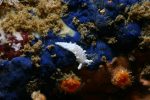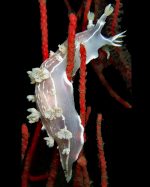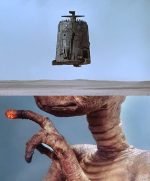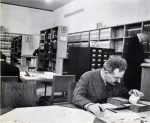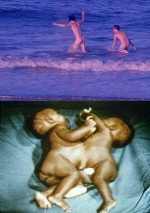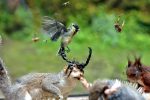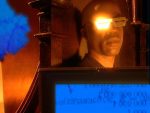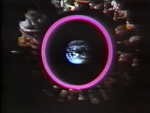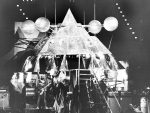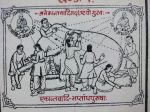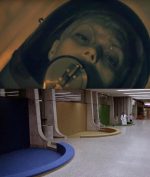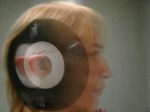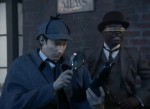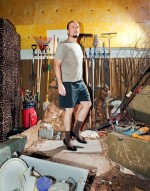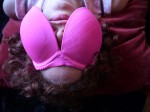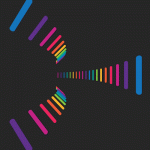Art Cinema OFFoff is a platform for experimental cinema and audiovisual art. OFFoff searches for films from the past and present that enter into cinematographic and narrative experiments, often navigating between cinema and the other arts. During the opening weekend of Kunsthal,Ghent, ArtCinema OFFoff puts up a broadcast on Domes FM around RRadio Triton, a collective and experimental research project produced by a.pass. The broadcast circles around relations between artistic research and speculative fictions. What kinds of futures do artistic research practices imagine? Which fictions are needed? And what voices do we need to bring those fictions up? The program for and the performance of the broadcast is a collaboration between ArtCinema OFFoff (Kunsthal Ghent), RRadio Triton (a.pass, Brussels) and Domes FM (Bidston Observatory Artistic Research Centre, Liverpool). With and by Deborah Birch, Edward Clive, Sven Dehens, Edward George, Christian Hansen, Pierre Rubio and Sina Seifee.
[audio mp3="https:///www.apass.be/wp-content/uploads/2019/01/soundcloud_excerpt.mp3"][/audio]
excerpt from the broadcast.... soon online in full...
Interviewer :
What is RRadio Triton?
RRadio Triton :
A seminar, 'Trouble on Radio Triton ((((((( changing (the) world (s) ))))))' was held in a.pass between January and April 2017 curated and organised by Pierre Rubio, gathering it forces and resources around the question of artistic imagination and political agency. Among other enquiries, some of the main questions that were raised during the seminar were: Do you--as artists--through your research contribute to changes in contemporary culture? And if so, what are the cultures generated by your research? Which alternative worlds does your artistic research/practice contain? What is the operative link between your artistic research and the future? Following that initiative, now the project RRadio Triton sets out to dream of operating like a time machine carrying its protagonists through time back to the 2017’s events and returning them as new narrators. By adopting the identity of an ad hoc fictional radio station, it records, edits, samples, remixes and releases pieces of audiowork and soundscapes that originated at the 2017 seminar. RRadio Triton is becoming a hybridised dispositive about the politics of imagination and speculation, not merely archiving, rather activating a labor-intensive work of memory elaborated by the notion of radio as an instrument operative on the real. This way of approaching archive and dissemination mirrors the current expressions of a.pass’s criticality as an institution that is committed to the ecologies of critique and the reformulation of its research-tools and practices.
The audio publication RRadio Triton is the outcome of the voluntary contributions of all the actors of the 2017 seminar and their recomposition in the present time.
Interviewer :
In response to the invitation of ArtCinema OFFoff to interact within the (re)opening event of the Kunsthal Gent in January 2019, RRadio Triton collaborates with curator Sven Dehens and will structure its first broadcast with two selected pieces that both perform complex critical dispositives around ideas of memory, reparation and worlding.
Through OFFoff webpage we can access to a lot of informations about the event, but how a radio station -even fictional like RRadio Triton became involved with a cinematic event?
RRadio Triton :
Some shared views on reparative fiction for sure… And a lot of the audio objects/pieces constituting RRadio Triton relating more or less directly to cinema. Thematically first with a strong relation with science-fiction cinema genres and subgenres and critical questions around utopia/dystopia -central nodes in S-F cinema. There is also a more practice based link with film and more specifically with film soundtracking as some pieces are made after sound research ateliers called “Foley your Research” that were performed around the question “how does/could your research sound like?”. As well, some pieces relate directly to existing films, whether because of the central thematic of one of the recorded live lectures, or because of a structuring cinematographic reference/quote/appropriation. And last, some pieces engage with convoking cinematographic images/bodies through sound. They channel bodies, affects, voices and presences through different use of sound and they ‘produce’ images without any actual camera.
Interviewer:
Could this be seen as a different form of worlding? One of RRadio Triton’s main endeavours?
RRadio Triton:
One of the justifications for worlding -imagining and situating the world otherwise- is that the stories of this world are getting toxic as they are mere instruments for social reproduction. Re-imagining the erased stories -erased by economical, colonial, patriarchal, ideological or cultural instrumental power orders and determining modes of governance- and speculating other stories can produce (and not only reproduce) other social orders and thus other worlds. The two pieces we are proposing in dialogue with Cinemas OFFoff both try to tackle the very possibility of imagining differently and thus create the necessary conditions for re-invention and speculation. They world.
Interviewer:
Can you present the pieces shortly?
RRadio Triton:
The first piece is a montage of a live lecture given by Sina Seiffe during Trouble on Radio Triton ((((((( changing (the) world (s) )))))) -a seminar held by a.pass in 2017, it focuses on a ‘problematic’ social media video and puts it back in motion critically, rebroadcasting it in a way. The second piece is an edit of a rare live communication -part of the same seminar- by Edward George revisiting his research work developed for the iconic film Last Angel of History.
Interviewer:
The radio will be hosted by Domes FM, an online radio station set up in the basements of the Bidston Observatoy Artistic Research Centre (BOARC).
What is BOARC?
RRadio Triton:
Located in the outskirts of Liverpool, BOARC is a not-for-profit study centre, focused on providing artists, writers, academics, performers etc with a cheap, temporary place to dictate their own methods of work, allowing them to come together and stay, to develop projects that require time and space, in a non-pressured environment.
Interviewer:
On Saturday the 26th of January, between 12h and 18h, one can follow and attend the live broadcast from Kunsthal Gent. There will be space for participation in diverse conversation formats held between the recorded audio pieces. In addition, on Friday the 25th of January, between 20h and 22h, there will be a Domes FM broadcast from the basements of the Bidston Observatory by Edward Clive, one of the hosts of the space. What will Edward Clive do?
RRadio Triton:
In reaction to RRadio Triton, he will bring a mix of soundtracks and queer experimental foley from the depths of science fiction cinema.
Interviewer:
Is it possible to listen to the broadcast online?
RRadio Triton:
Yes! One can follow the broadcast online during the announced hours. The URL for the broadcast will be announced in time.
Interviewer:
Can I get the credits of RRadio Triton’s pieces?
RRadio Triton:
Of course, here you go...
RRadio Triton is an a.pass production initiated, curated and hosted by Pierre Rubio, and is technically, artistically and dramaturgically supported by Christian Hansen and Sina Seifee. The pieces we will broadcast on the 26th of January from Kunsthal Ghent on Domes FM Liverpool are:
‘An Animal Escape Case’
an audio editing of a live essay-performance, 70’, 2019
Author and Performer/Lecturer Sina Seiffe
Editor Pierre Rubio / Sound Christian Hansen / Production a.pass
The lecture was performed in March 2017 in Brussels within the lectures series “Book Club/Trouble on Radio Triton” at a.pass (advanced performance and scenography studies - a platform for artistic research)
In his essay-performance ‘An Animal Escape Case’, Sina Seifee opens one object. He unpacks the destiny of a social media video file about a feral cat, that, in anthropomorphic terms, adopted a kitten, and the reactions of Sina’s family in Tehran towards these shared social-media digital images. This object and relational event is transformed into a landscape of observations, philosophical concerns, sociological anthropological and historical analyses. The complex arrangement relates diverse notions as, greeting, encounter, understanding, friendship, technology and most importantly, a destabilizing reality for humans, that of wildness. Sina performs as the narrator of a kind of film in which he is both the witness and the main actor. The edited audio piece tries to bring back his (intense) presence and incarnated storytelling, as well as the many references and borrowings to popular and not popular culture both from Iran and the West.
The essay/performance investigates the fragile intersections of friendship between digital avatars and trans-animals in the social media in Tehran’s landscape. Through personal animal-findings and fairy-tale associations the An Animal Escape Case interprets the epistemological openings and closings in cross-species sociality, exemplified by the everyday use of mobile phones where images of pets circulate and different species meet in mediated formats. By analyzing everything that anthropomorphism can perform and contain, and seen through the animality in the situated conditions of contemporary domestic life, the essay/performance addresses the relationships between people, animals and their surroundings in a socio-technological milieu as complex as Tehran’s urban environment. (Sina Seifee)
Sina Seifee is an artist-researcher-storyteller working on poetics of animal description (ecological cosmologies of nonhumans-with-history). Born in Tehran (1982), he studied Applied Mathematics in Beheshti University and Visual Arts in Charsoo Institute of Art in Tehran. After moving to Germany in 2011, he graduated in Cologne with master diploma in Media Arts from Kunsthochschule für Medien Köln (2014) and received his postmaster in Advanced Performance and Scenography Studies from a.pass in Brussels (2017).
His work, realized in different forms of lecture-performances, reading group, workshops, image making, video and writing- is centered around the questions of technology, storytelling, globalism and intercultural mythologies in the heterogeneous knowledge-worlds of art and sciences, with attention to the premodern era.
‘Last angel of history’
an audio editing of a live lecture, 3 episodes of 30', 2019
Author and Performer/Lecturer Dr. Edward George
Editor Pierre Rubio / Sound Christian Hansen / Production a.pass
The lecture was performed in March 2017 in Brussels within the lectures series “Book Club/Trouble on Radio Triton” at a.pass (advanced performance and scenography studies - a platform for artistic research)
Dr. Edward George is the writer, researcher, and narrator of the seminal fiction-documentary film The Last Angel of History. In a rare live communication he shares the research processes and thinking that supported the creation of the film. The audio piece revisits George revisiting his work of revisiting the lineage of Afrofuturism.
The Last Angel of History is one of the most influential video-essays of the 1990s influencing filmmakers and inspiring conferences, novels and exhibitions. Black Audio Film Collective’s exploration of the chromatic possibilities of digital video is embedded within a mythology of the future that creates connections between black (un)popular culture, outer space and the limits of the human condition. The influential Black Audio Film Collective crafted this experimental blend of sci-fi parable and essay film, which also serves as an essential primer on the aesthetics and dynamics of contemporary Afrofuturism. Interviews with esteemed musicians, writers, and cultural critics are interwoven with the fictional story of the “data thief,” who must travel through time and space in search of the code that holds the key to his future.
Dr. Edward George is a founding member of Black Audio Film Collective (1982-1998), the multimedia duo Flow Motion (1996-present), and the electronic music group Hallucinator (1998-present). He lives in London.

